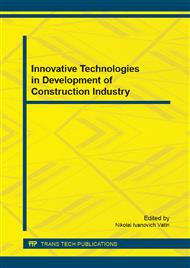[1]
Vatin, N.I., Nemova, D.V., Tarasova, D.S., Staritcyna, A.A. Increase of energy efficiency for educational institution building (2014) Advanced materials research, 953-954, pp.854-870.
DOI: 10.4028/www.scientific.net/amr.953-954.854
Google Scholar
[2]
Dunikov, D.O., Borzenko, V. I., Malyshenko, S.P., Blinov, D.V., Kazakov, A.N. Prospective technologies for using biohydrogen in power installations on the basis of fuel cells (a review) (2013).
DOI: 10.1134/s0040601512110043
Google Scholar
[3]
Malyshenko, S.P., Borzenko, V.I., Dunikov, D.O., Nazarova, O.V. Metal hydride technologies of hydrogen energy storage for independent power supply systems constructed on the basis of renewable sources of energy (2012).
DOI: 10.1134/s0040601512060055
Google Scholar
[4]
Gahleitner, G. Hydrogen from renewable electricity: An international review of power-to-gas pilot plants for stationary applications (2013) International Journal of Hydrogen Energy, 38 (5), p.2039-(2061).
DOI: 10.1016/j.ijhydene.2012.12.010
Google Scholar
[5]
Surendra, K.C., Takara, D., Hashimoto, A.G., Khanal, S.K. Biogas as a sustainable energy source for developing countries: Opportunities and challenges (2014) Renewable and Sustainable Energy Reviews, 31, pp.846-859.
DOI: 10.1016/j.rser.2013.12.015
Google Scholar
[6]
Havukainen, J., Uusitalo, V., Niskanen, A., Kapustina, V., Horttanainen, M. Evaluation of methods for estimating energy performance of biogas production (2014) Renewable Energy, 66, pp.232-240.
DOI: 10.1016/j.renene.2013.12.011
Google Scholar
[7]
Chaubey, R., Sahu, S., James, O.O., Maity, S. A review on development of industrial processes and emerging techniques for production of hydrogen from renewable and sustainable sources (2013).
DOI: 10.1016/j.rser.2013.02.019
Google Scholar
[8]
Alves, H.J., Bley Junior, C., Niklevicz, R.R., Frigo, E.P., Frigo, M.S., Coimbra-Araújo, C.H. Overview of hydrogen production technologies from biogas and the applications in fuel cells (2013).
DOI: 10.1016/j.ijhydene.2013.02.057
Google Scholar
[9]
Rodriguez-Verde, I., Regueiro, L., Carballa, M., Hospido, A. Lema, J.M. Assessing anaerobic co-digestion of pig manure with agroindustrial wastes: The link between environmental impacts and operational parameters (2014).
DOI: 10.1016/j.scitotenv.2014.07.127
Google Scholar
[10]
Bauer, F, Persson T, Hulteberg, C, Tamm, D. Biogas upgrading – technology overview, comparison and perspectives for the future (2013) Biofuels, Bioproducts and Biorefining, 7(5), pp.499-511.
DOI: 10.1002/bbb.1423
Google Scholar
[11]
Fedorov, M.P., Maslikov, V.I., Chusov, A.N., Molodtsov, D.V. The experimental complex for hydrogen production from organic wastes for use in fuel cells (2011) St. Petersburg State Polytechnical University Journal, 4 (135), pp.35-41. (rus).
Google Scholar
[12]
Chusov, A.N., Zubkova, M. Yu., Korablev, V.V., Maslikov, V.I., Molodtsov, D.V. The technology of using hydrogen-containing mixtures based on biogas in fuel cells for energy supply autonomous consumers (2013).
Google Scholar
[13]
Zubkova, M. Yu., Korablev, V.V., Maslikov, V.I., Molodtsov, D.V., Chusov, A.N. Usage of hydrogen-containing fuel received from biogas for autonomous power supply in housing (2013).
DOI: 10.4028/www.scientific.net/amr.941-944.2107
Google Scholar
[14]
Fedorov, M.P., Chusov, A.N., Maslikov, V.I., Zubkova, M. Yu., Molodtsov, D.V. Studies processes direct feed converter biohydrogen in low temperature fuel cell (2011).
Google Scholar
[15]
Zubkova, M. Yu., Maslikov, V.I., Molodtsov, D.V., Chusov, A.N. Experimental research of hydrogenous fuel production from biogas for usage in fuel cells of autonomous power supply systems (2014) Advanced Materials Research, 941-944, pp.2107-2111.
DOI: 10.4028/www.scientific.net/amr.941-944.2107
Google Scholar
[16]
Zubkova, M. Yu., Maslikov, V.I., Molodtsov D.V., Chusov, A.N. The ways assessment of direct production electricity and heat from hydrogenous fuel based on biogas for autonomous consumers (2014).
DOI: 10.4028/www.scientific.net/amm.587-589.330
Google Scholar
[17]
Schmersahl, R., Janine, E., Volkhard, S. Dampfreformierung von biogas für PEM-brennstoffzellen. Available at: http: /brennstoffzellen. pitcom. net/upload/dokument139. pdf (accessed October 05, 2014).
Google Scholar


